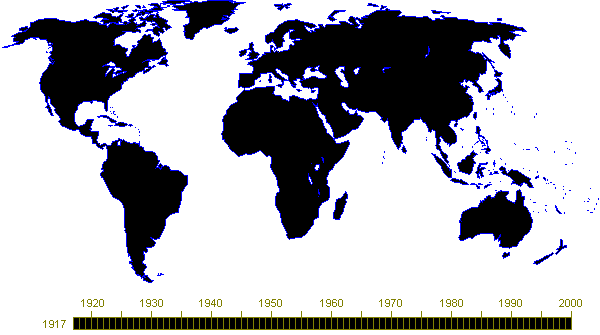
Source: http://users.erols.com/mwhite28/communis.htm
After the Russian Revolution, revolutionary socialist ideology grew throughout Europe, Asia and America. The Socialist Revolution was initially intended to be a revolution that would take place primarily in established capitalist economies where workers had become oppressed by the Industrial Revolution. This is the process that was taking place in Europe and America leading up to World War II. In many ways it was this process that triggered the development and growth of the counter Marxist ideology of Fascism in Europe.
During the early 20th century Marxist thinkers such as Lenin and Rosa Luxemburg built on Karl Marx's economic framework and concluded that capitalist economies would be able to sustain themselves for much longer than Marx had predicted through the exploitation of third-world countries. During the 1800s and very early 1900s Marxist views on a coming crisis in capitalism had been largely built on a view of the advanced European economies as confined within their own boundaries. Luxemburg and others realized the flaws in this view and adjusted Communist ideology accordingly.
After World War II though the Socialist Revolution took on a new role, a role that it was not initially intended for by Marx and the early Communists. The spread of "Communism" after World War II was mostly an anti-imperialist reactionary movement. Communist Parties became popular in Korea, Vietnam, China and Cuba because the people were oppressed by foreign interests within their own countries. Communists offered a way out. It is important to understand that no country has ever established a communist society. Countries that are said to have become "Communist" are countries in which the Communist Party became the dominate political party, but none of these parties implemented a communist system, nor did they even believe it was possible to implement such a system immediately. Unfortunately, the Stalinist system was the only working model that had been established for these countries to follow. Despite the fact that the Communist movement was supposed to be a movement for democracy, the fact that Communist parties took control in countries that had no tradition of democracy resulted in the rise of regimes that ruled in the totalitarian pattern of their ancestry. In addition, the strong military opposition to Communist revolutions in these countries by Western powers, primarily the United States, only served to reinforce the Stalinist model.
Furthermore the economies of these countries were dependant on foreign trade in order to establish stability after their revolutions, however, at a time when they needed international cooperation most, they got the opposite, they got attacked militarily or embargoed or both.

Source: http://users.erols.com/mwhite28/communis.htm
During the Cold War, the Soviet Union pursued a foreign policy in line with the "new" Marxist recognition that the 20th century would be a century of struggle over third-world resources. During the Cold War the Soviet Union basically abandoned the idea of promoting Communism among other Industrialized nations, and instead sough to bring third-world countries into the Communist block. This was seen as a strategy to legitimately liberate third-world countries from foreign exploitation, as well as a means to help modernize and educate undeveloped regions, and it was seen as a means to deny vital resources to Industrialized nations, which were, and are, dependant on the resources of under developed countries in order to sustain their economies.
Throughout the post World War II era many under developed countries came to be governed by so-called Communist regimes. These countries were dealt with harshly by Western powers for two significant reasons. One: in the process of revolution these countries were trying to establish independence from foreign control, so regardless of whether or not they were adopting "socialism" the foreign powers would have fought against the action. Two: since they were adopting "socialism" the capitalist Western powers felt threatened by them as a part of global Communist revolution. Capitalist leaders wanted to make sure that these countries would fail because, of course, the goal of Communists is to develop a system free from private ownership, which is definitely not in the best interests of people who are wealthy due to private ownership.

Cuba is a prime example of this. Approximately 90% of Cuban property was owned by Americans prior to the Cuba Revolution. Cuba, which was briefly occupied by the United States after the Spanish-American War, was heavily influenced by American interests. Cuba was essentially a giant American plantation and vacation resort prior to the revolution. This is why American leaders took such drastic actions to sabotage Cuban success, because it was felt that if Cuba, especially being so close to America and because it was previously dominated by America, were shown to improve its condition through the use of socialism that it would validate the socialist system to Americans, South Americans, and the world. This is why it was deemed a top priority to undermine the country of Cuba or to overthrow its socialist government.
To achieve this America lead an international trade embargo on Cuba. America persuaded all of South and Central America, as well as Europe, to break all trade with Cuba. Mexico was the lone dissenter.
Unfortunately for the Cuban people, not only have the economic sanctions against Cuba had a negative effect on the Cuban economy and society, but Fidel Castro has also implemented a harsh and impractical system that, at its height, dramatically limited the freedoms of Cubans. Though Fidel's regime has softened since the fall of the Soviet Union, the island nation is still dominated by a politically oppressive regime and is still plagued by an impoverished economy. In fact, the Cuban economy has gotten much worse since the fall of the Soviet Union, because the Soviet Union used to provide significant economic aid to Cuba.
The following link covers America’s attempt to get Mexico to embargo Cuba, and subsequent use of the Mexican relations with Cuba as a source for intelligence gathering:
http://www.gwu.edu/~nsarchiv/NSAEBB/NSAEBB83/press.htm
For more details on the Communist Revolution in Cuba see:
http://www.newyouth.com/archives/theory/faq/cuba_che_castro.asp
Cuban history:
http://www.emayzine.com/lectures/HISTOR~7.htm
| Previous | Next | Contents |
|
| ||||||||||||||||